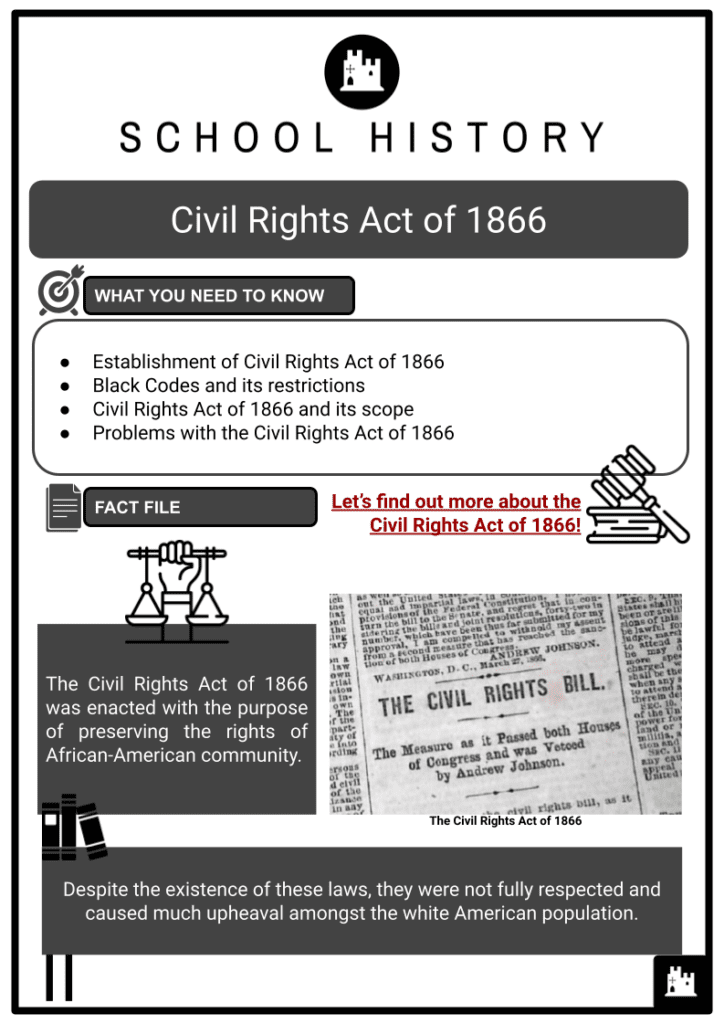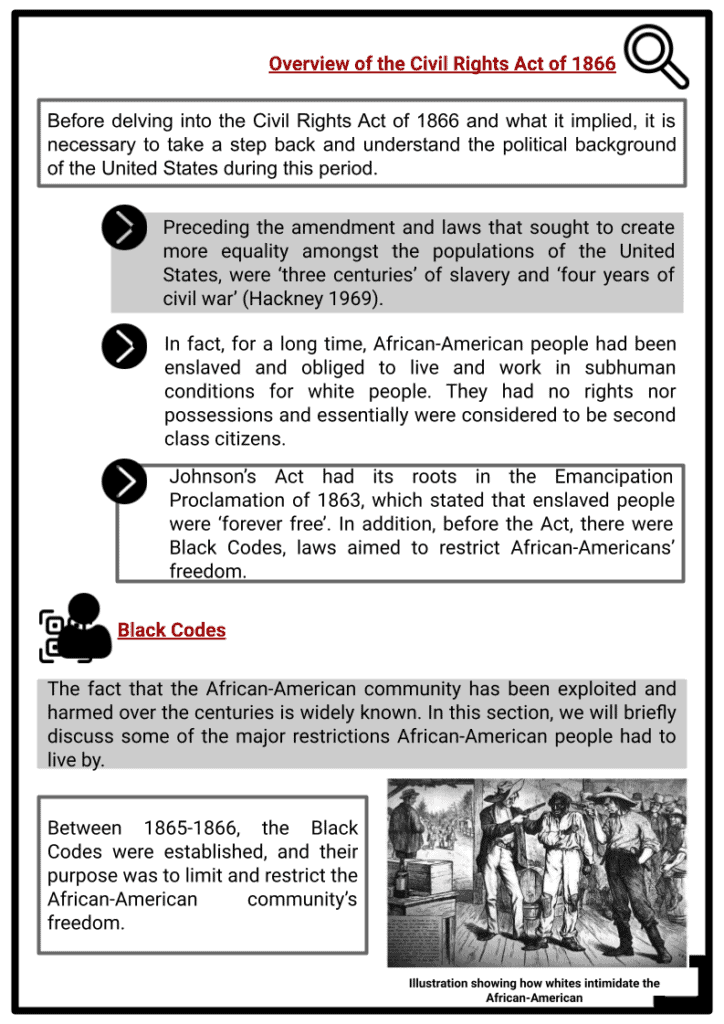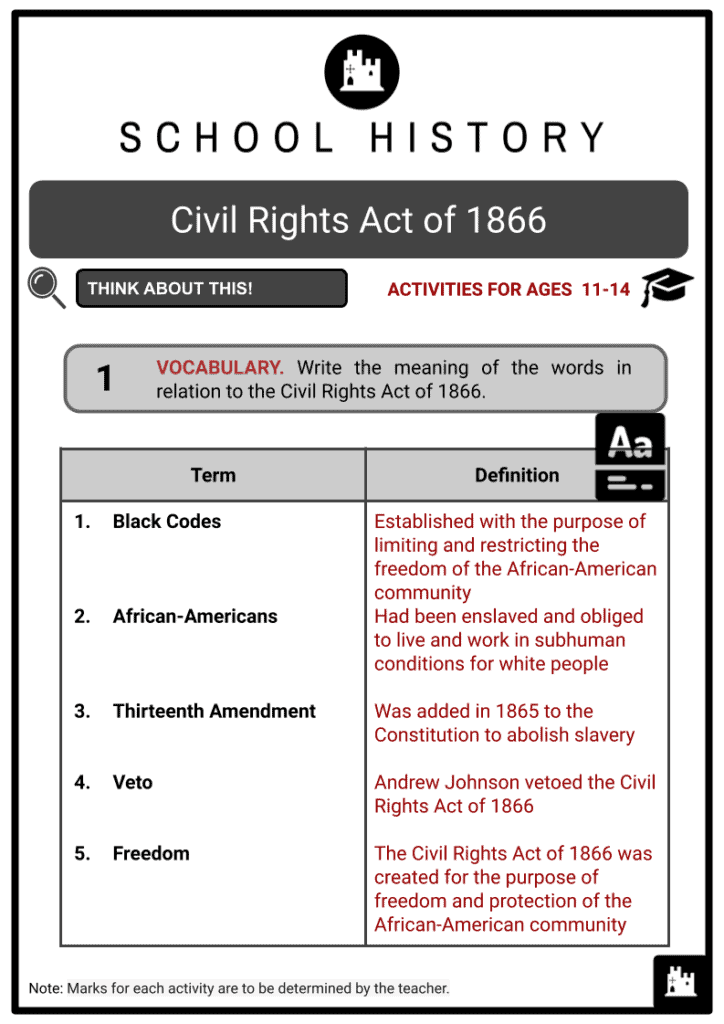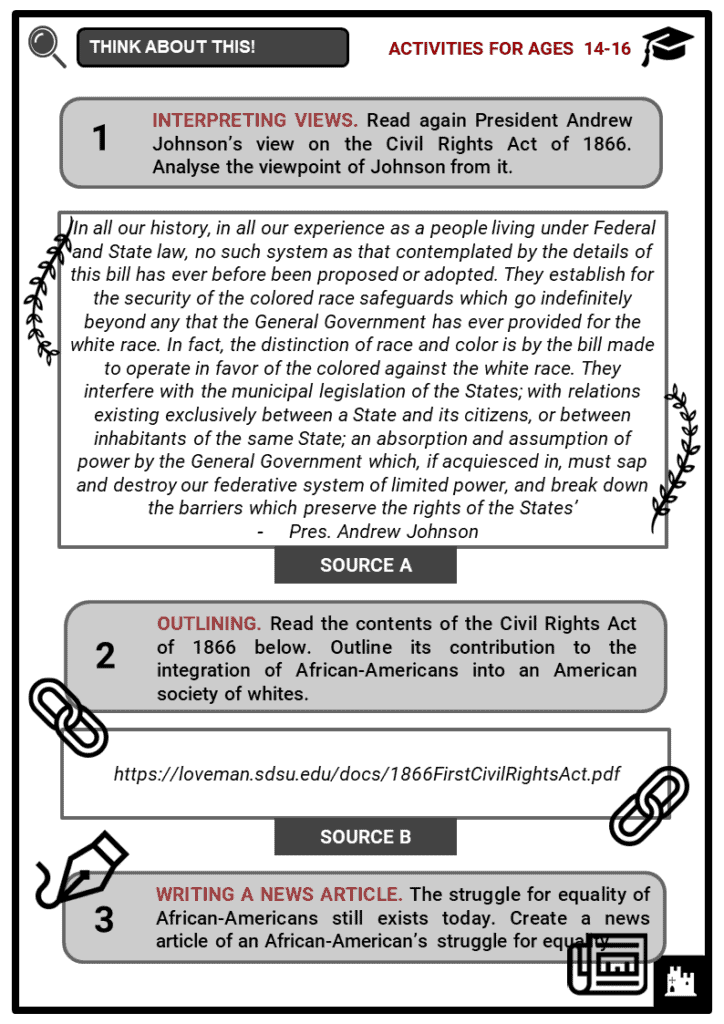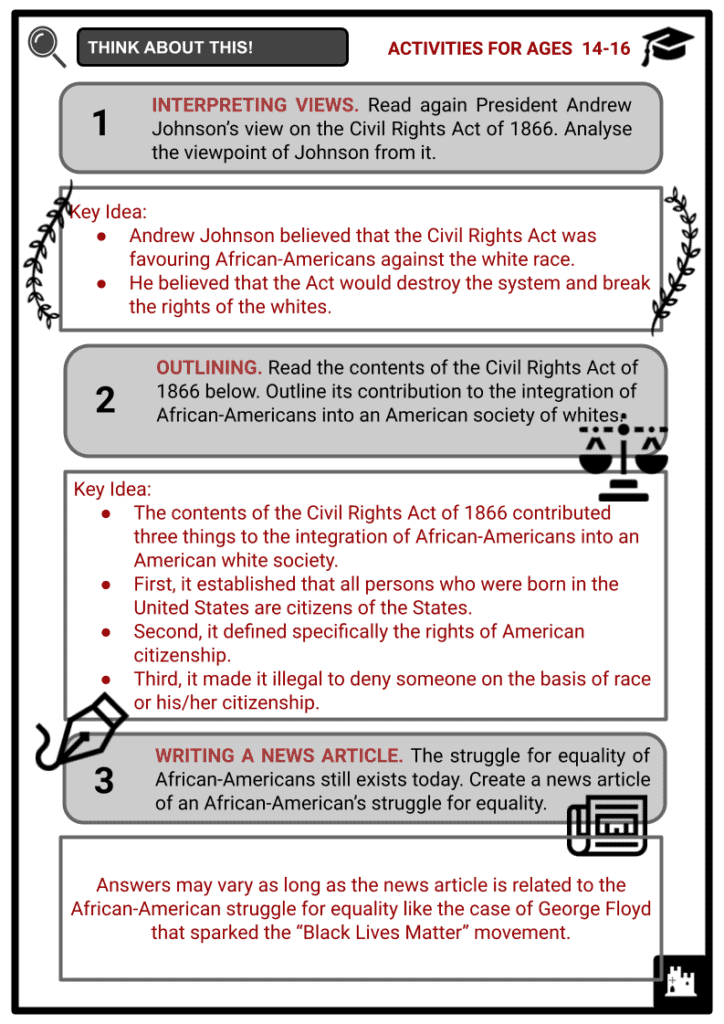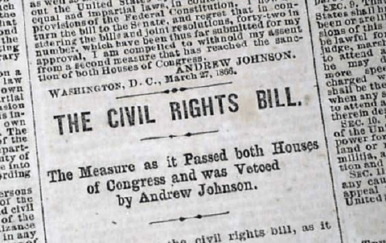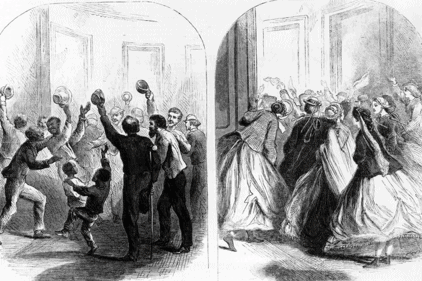Download Civil Rights Act of 1866 Worksheets
Do you want to save dozens of hours in time? Get your evenings and weekends back? Be able to teach Civil Rights Act of 1866 to your students?
Our worksheet bundle includes a fact file and printable worksheets and student activities. Perfect for both the classroom and homeschooling!
Summary
- Establishment of Civil Rights Act of 1866
- Black Codes and its restrictions
- Civil Rights Act of 1866 and its scope
- Problems with the Civil Rights Act of 1866
Key Facts And Information
Let’s find out more about the Civil Rights Act of 1866!
- The Civil Rights Act of 1866 was enacted with the purpose of preserving the rights of the African-American community.
- Despite the existence of these laws, they were not fully respected and caused much upheaval among the white American population.
Overview of the Civil Rights Act of 1866
- Before delving into the Civil Rights Act of 1866 and what it implied, it is necessary to take a step back and understand the political background of the United States during this period.
- Preceding the amendment and laws that sought to create more equality amongst the populations of the United States, were ‘three centuries’ of slavery and ‘four years of civil war’ (Hackney 1969).
- In fact, for a long time, African-American people had been enslaved and obliged to live and work in subhuman conditions for white people. They had no rights nor possessions and essentially were considered to be second class citizens.
- Johnson’s Act had its roots in the Emancipation Proclamation of 1863, which stated that enslaved people were ‘forever free’. In addition, before the Act, there were Black Codes, laws aimed to restrict African-Americans’ freedom.
Black Codes
- The fact that the African-American community has been exploited and harmed over the centuries is widely known. In this section, we will briefly discuss some of the major restrictions African-American people had to live by.
- Between 1865-1866, the Black Codes were established, and their purpose was to limit and restrict the African-American community’s freedom.
- In fact, despite the abolition of slavery during the Civil War, it ‘ensure[d] their availability as cheap labor’ (History Editors 2018).
- Although Lincoln’s successor started the Reconstruction (for equal rights), the South reestablished the provisions of the Black Codes under the Jim Crow Laws, which were active for almost a century: they were abolished only with the introduction of the Civil Rights Act of 1964 (History Editors 2018).
- The United States’ South had based its economy on slavery, and in April 1865, when Lincoln proposed ‘limited suffrage for African-Americans in the South’, he was killed only a few days later (History Editors 2018).
So how was the black community restricted?
- African-Americans could not own any property they desired, and some States created strict laws that would ‘punish anyone who offered higher wages to a black labourer’ (History Editors 2018).
- If an African-American decided to end a contract, they ‘were subject to arrest, beating and forced labor’ (History Editors 2018).
- Furthermore, minors that were orphans, or that came from a poor family that was ‘unable to support them’ with a judge, were forced into unpaid ‘apprenticeship’ programmes that would have them work on farms (History Editors 2018).
- Therefore, the voices of African-American community were silenced by the harsh laws and punishments imposed by the government.
- However, the Black Codes created much disapproval amongst the people in the North who ‘argued that the codes violated the fundamental principles of free labour ideology’ (History Editors 2018).
Civil Rights Act of 1866
- ‘In all our history, in all our experience as a people living under Federal and State law, no such system as that contemplated by the details of this bill has ever before been proposed or adopted. They establish for the security of the colored race safeguards which go indefinitely beyond any that the General Government has ever provided for the white race. In fact, the distinction of race and color is by the bill made to operate in favor of the colored against the white race. They interfere with the municipal legislation of the States; with relations existing exclusively between a State and its citizens, or between inhabitants of the same State; an absorption and assumption of power by the General Government which, if acquiesced in, must sap and destroy our federative system of limited power, and break down the barriers which preserve the rights of the States’ - (President Andrew Johnson)
- In 1865, the Thirteenth Amendment was added to the Constitution and stated that ‘neither slavery nor involuntary servitude, except as punishment for crime whereof the party shall have been duly convicted, shall exist within the United States, or any place subject to their jurisdiction’ (West’s Encyclopaedia of American Law 2005).
- In other words, slavery had been abolished.
- On 9 April, 1866, the United States Congress enacted the Civil Rights Act which had the purpose of protecting the rights of the formerly enslaved people.
- The following statements were made by President Andrew Johnson’s veto, and they established that:
- ‘All persons born in the United States and not subject to any foreign power [..] are declared to be citizens of the United States [..]. It is now proposed by a single legislative enactment to confer the rights of citizens upon all persons of African descent. [All persons born in the United States] without regard to race or colour, shall have the right to act as juror or as judge, to hold any office, and finally to vote, in every State and Territory of the United States’ (Johnson 1866).‘All persons born in the United States and not subject to any foreign power [..] are declared to be citizens of the United States [..]. It is now proposed by a single legislative enactment to confer the rights of citizens upon all persons of African descent. [All persons born in the United States] without regard to race or colour, shall have the right to act as juror or as judge, to hold any office, and finally to vote, in every State and Territory of the United States’ (Johnson 1866).
- The bill imposed a fine ‘not exceeding $1,000’ and imprisonment for legislators and people who do not respect the laws of the Civil Rights Act (Johnson 1866).
- In fact, as the President claimed in his Act: ‘if you decide that this act is unconstitutional; if you hold that over such a subject-matter the said law is paramount, under colour of a State law refuse the exercise of the right to the negro; your error of judgment, however conscientious, shall subject you to fine and imprisonment’ (1866).
- Those who ‘deny to a coloured person any rights’ will be committing ‘a crime against the laws of the State’ that will be equal to ‘murder, arson, rape, or any other crime’ (Johnson 1866).
- As a consequence, ‘all protection and punishment through the courts of the State [will be] taken away, and [the people will be] tried and punished in the Federal courts’ (Johnson 1866).
- African-American citizens ‘had the right to enforce contracts, sue and be sued, give evidence in court, and inherit, purchase, lease, sell, hold, and convey real and personal property’ (African-American Civil Rights Movement, no date).
- In Congress, Johnson’s Act (which became part of the Fourteenth Amendment passed in 1868) was supported by 122 members versus 41 that disapproved (African-American Civil Rights Movement, no date).
- In fact, in support of the new act, a House Judiciary Committee, Rep. William Lawrence stated:
‘There are certain absolute rights which pertain to every citizen, which are inherent, and of which a State cannot constitutionally deprive him. But not only are those rights inherent and indestructible, but the means whereby they may be possessed and enjoyed are equally so. … Every citizen, therefore, has the absolute right to live, the right of personal security, personal liberty, and the right to acquire and enjoy property. These are rights of citizenship. As necessary incidents of these rights there are others, as the right to make and enforce contracts, to purchase, hold, and enjoy property, and to share the benefit of laws for the security of person and property’.
- Yet, despite Andrew Johnson’s attempt to integrate formerly enslaved within society, the Civil Rights Act did not have much success and ‘failed to protect’ the African-Americans against segregation, racism, and intimidation (African-American Civil Rights Movement, no date).
- Furthermore, it is believed that such Act reinforced the hatred towards the African-American community and fuelled the Ku Klux Klan, which spread death and violence over the country.
Problems with the 1886’s Civil Rights Act
- During the Civil War, around four million enslaved people fighting in the various American States had gained their freedom. However, their ‘freedom’ still rested on shaky foundations.
- Although the African-American community was ensured certain civil rights such as ‘the right to enforce contracts, sue and be sued, give evidence in court, and inherit, purchase, lease, sell, hold, and convey real and personal property’ (African-American Civil Rights Movement, no date), they were still excluded from ‘political rights’ such as the right to vote, and holding public offices, and were not entitled to ‘social rights’ which allowed them decent accommodation and the right to attend schools in the same way as white people.
- In fact, the feelings of distinction and superiority between African-Americans and whites were still very evident within society.
- Voting and accommodation were purposely omitted in the creation of the Act, and when the bill was introduced, the Representative James F. Wilson of Iowa underlined certain aspects that still marked white people as privileged.
- Here are some excerpts from his discourse that will shed some light on how ‘civil rights’ ought to be understood:
- […] What do these terms mean? Do they mean that in all things civil, social, political, all citizens without distinction of race or colour, shall be equal? By no means can they be construed. Do they mean that all citizens shall vote in the several States? No; for suffrage is a political right which has been left under the control of the several States, subject to the action of Congress only when it becomes necessary to enforce the guarantee of a republican form of government’ (Longley 2018; citing James F. Wilson).
- ‘Their children shall [not] attend the same schools’ (Longley 2018; citing Wilson).
- ‘Civil rights are those which have no relation to the establishment, support, or management of government’ (Longley 2018; citing Wilson).
Image sources:

